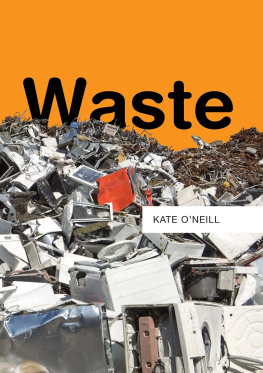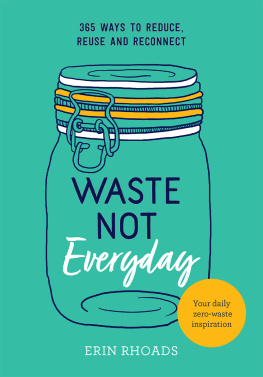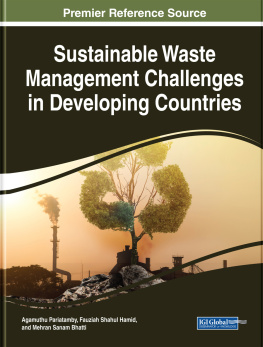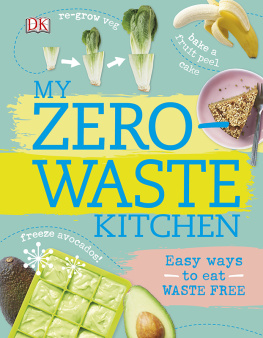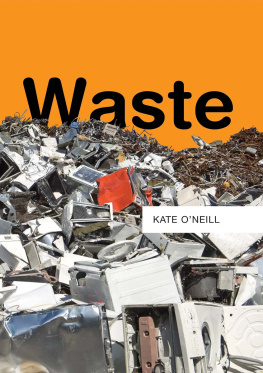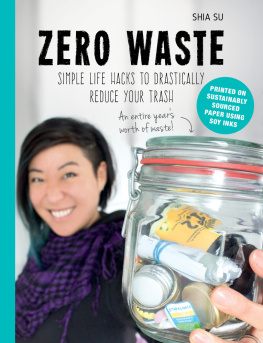
Resources series
Gavin Bridge & Philippe Le Billon, Oil, 2nd edition
Anthony Burke, Uranium
Jennifer Clapp, Food, 2nd edition
Peter Dauvergne & Jane Lister, Timber
Elizabeth R. DeSombre & J. Samuel Barkin, Fish
Kate Ervine, Carbon
David Lewis Feldman, Water
Gavin Fridell, Coffee
Derek Hall, Land
Andrew Herod, Labor
Kristy Leissle, Cocoa
Michael Nest, Coltan
Kate ONeill, Waste
Bronwyn Parry and Beth Greenhough, Bioinformation
Ben Richardson, Sugar
Ian Smillie, Diamonds
Adam Sneyd, Cotton
Mark Thurber, Coal
Bill Winders, Grains
Waste
KATE ONEILL
polity
Copyright Kate ONeill 2019
The right of Kate ONeill to be identified as Author of this Work has been asserted in accordance with the UK Copyright, Designs and Patents Act 1988.
First published in 2019 by Polity Press
Polity Press
65 Bridge Street
Cambridge CB2 1UR, UK
Polity Press
101 Station Landing
Suite 300
Medford, MA 02155, USA
All rights reserved. Except for the quotation of short passages for the purpose of criticism and review, no part of this publication may be reproduced, stored in a retrieval system or transmitted, in any form or by any means, electronic, mechanical, photocopying, recording or otherwise, without the prior permission of the publisher.
ISBN-13: 978-0-7456-8743-8
A catalogue record for this book is available from the British Library.
Library of Congress Cataloging-in-Publication Data
Names: ONeill, Kate, 1968- author.
Title: Waste / Kate ONeill.
Description: Cambridge, UK ; Medford, MA, USA : Polity Press, 2019. | Includes bibliographical references and index.
Identifiers: LCCN 2018061778 (print) | LCCN 2019000572 (ebook) | ISBN 9780745687438 (Epub) | ISBN 9780745687391 (hardback) | ISBN 9780745687407 (pbk.)
Subjects: LCSH: Refuse and refuse disposal--Economic aspects. | Recycling (Waste, etc.) | International economic integration.
Classification: LCC HD4482 (ebook) | LCC HD4482 .O54 2019 (print) | DDC 363.72/8--dc23
LC record available at https://lccn.loc.gov/2018061778
The publisher has used its best endeavours to ensure that the URLs for external websites referred to in this book are correct and active at the time of going to press. However, the publisher has no responsibility for the websites and can make no guarantee that a site will remain live or that the content is or will remain appropriate.
Every effort has been made to trace all copyright holders, but if any have been overlooked the publisher will be pleased to include any necessary credits in any subsequent reprint or edition.
For further information on Polity, visit our website: politybooks.com
Dedication
For My Parents
Bob and Sally ONeill
For encouraging a lifelong interest in trash and where it goes (and for childhood trips to the Canberra tip, where, according to my dad, you could rely on finding diplomats, politicians and retired admirals prospecting for secondhand treasures)
Abbreviations
BANBasel Action NetworkBo2WBest of Two WorldsBPAbisphenol ACEcircular economyEPRextended producer responsibilityEUEuropean UnionGAIAGlobal Alliance for Incineration Alternatives (now known simply as GAIA)GlobalRecGlobal Alliance of Waste PickersGWMOGlobal Waste Management OutlookHS CodeHarmonized SystemISRIInstitute for Scrap Recycling IndustriesISWAInternational Solid Waste AssociationMRFmaterials recovery facilityMSWmunicipal solid wastemtmillion tons (metric)NGOnon-governmental organizationNRDCNational Resources Defense CouncilOECDOrganization for Economic Cooperation and DevelopmentRICresin identification codeRIOSRecycling Industry Operating StandardSDGsSustainable Development GoalsStEPSolving the E-waste ProblemSWANASolid Waste Association of North AmericaUNEPUnited Nations Environment ProgrammeUNFAOUnited Nations Food and Agriculture OrganizationUSEPAUS Environmental Protection AgencyWIEGOWomen in Informal Employment: Globalizing and OrganizingWRAPWaste and Resource Action ProgrammeWTEwaste-to-energyWTOWorld Trade OrganizationZWZero Waste
Preface and Acknowledgments
Sitting in my office many nights, weekends, and holidays, and writing about waste was something of a wrenching experience. As anyone who has taken the lid off their reusable coffee mug to see the remnants of last weeks latte staring right back at them knows, living a low-waste life is challenging for those of us who grew up in cultures of disposability. We make decisions about what we throw out, what we recycle, and what we buy or do not buy in the first place all the time, although we do not always think about the consequences of our decisions. This often means those discarded items are shipped to places overseas to be dismantled or recycled and resold.
This book is designed to make these journeys visible. It draws attention to the global markets that exist for discarded goods, and the livelihoods that depend on extracting value from what others have thrown away. It also makes visible the risks attendant on this new resource frontier, the growth of global activism around waste and recycling, and how actors engaged in governing these transactions are responding. It is less about individual consumer choices and behavior than about the systems in which our practices are embedded.
I am writing this at a time when levels of wastes particularly plastic wastes are higher than they ever have been on global, national, and local political agendas, and it is clear that a lot will change over the next few years. It is also true that I have had to leave a lot out of this short book (readers are encouraged to follow up on issues that interest them on their own). Despite all the challenges and problems, at the end of this writing process I felt moderately optimistic about our ability to address the global waste crisis, even if we cant solve it.
Despite all the hours of solitary writing, this book is really the product of many interactions and conversations. One of the things I enjoy about working on waste is that anyone I talk to, anywhere, about what I do has a story to tell or a comment to make. Many of these made it into this book or informed the directions I chose. Therefore, first of all, I would like to thank everyone who took the time to engage with me at conferences and presentations, in class and on campus, at the gym, at airports, in restaurants, on hikes, etc., over the past several years and share their experiences and opinions on the topics in this book.
For particular help with reading, editing, and commenting on draft chapters, my special thanks to Alastair Iles, Erin Bergren, Raul Pacheco-Vega, and Manisha Anantharaman. I would also like to acknowledge my undergraduate research assistants, including Leila Hooshyear, Sierra Westhem, and Aubrey Hills. Thanks to Peter Dauvergne, Shannon Davis, Emily Polsby, Freyja Knapp, Louise Mellor, Aaron King (Seven Seas Hauling), Amy Mason, Scott Silva, Anna Yip, and the UC Berkeley Zero Waste community for inspiration. Josh Lepawsky and the editors at Welt-Sichten: Magazin fr globale Entwicklung und kumenische Zusammenarbeit helped me with figures and data. Jenny Weeks at The Conversation published my earlier pieces on China and Operation National Sword, which I drew on extensively. Likewise, many great people in the waste and discard studies communities on Twitter helped me out at various times with many queries, small and large, and I am immensely grateful for this community. Thanks also to Louise Knight, Sophie Wright, and Nekane Galdos at Polity Press for being so patient with me, and to two anonymous reviewers for their helpful comments.
Next page
